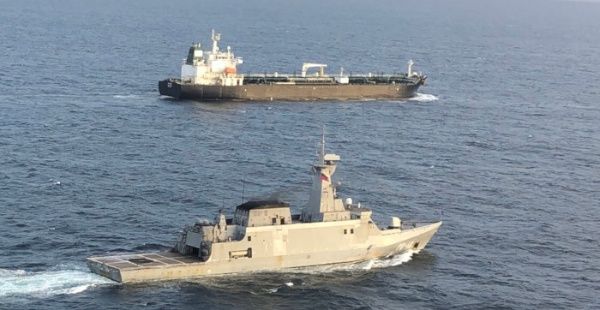
The first of five Iranian tankers to break the US blockade last month is escorted to port by the Venezuelan navy.
Fuel supplies have been restored at Venezuela’s gas stations as a new fuel distribution and pricing regime came into effect last week. Government officials hope the policy will stabilise the market and end shortages, while reducing the burden of public subsidies on sanctioned state-run oil firm PDVSA.
Successive Venezuelan governments have maintained a long-standing policy of heavily subsidising fuel since a price hike and sweeping austerity package sparked a popular uprising in 1989, known as the Caracazo. Prices were, however, marginally raised in 1996 and 2016 as periods of hyper-inflation rendered them impossible to maintain.
Under the new system, Venezuelans are able to purchase up to 120 litres of gasoline or diesel a month for vehicles, or 60 litres for motorbikes, at a subsidised price of 5,000 Bolivars per litre (US $0.025). To qualify, customers must have registered their vehicle in the government’s Patria website, entitling them to visit fuel stations one day a week according to their registration plate, for the first thirty days. 1,368 of the country’s 1,568 fuel stations have been designated to supply fuel at this price, which is 75% subsidised by the state.
In addition to the subsidised quota, customers have the option of purchasing an unlimited amount of fuel at a premium price of US $0.50, payable in US dollars, or at the floating equivalent in Bolivars or Petros. The country’s 200 remaining stations have been “authorised” to charge the dollarized rate as well as independently import fuel, effectively ending a 50-year-long state monopoly on gasoline supply.
It is estimated that the fuel subsidies cost Venezuela US $12 billion a year, as well as a further US$18 billion in extractive fuel smuggling incentivised by the huge price disparities with neighbouring countries, Colombia in particular.
Reaction to the fuel market reform has been mixed. While most commentators agree that the price increase was a “necessary measure,” some have criticised the continued use of blanket subsidies, arguing that targeted subsidies based on income brackets would be more effective and avoid creating new avenues for corruption. LINK
The implementation of the new system follows the arrival of five Iranian tankers carrying 1.5 million barrels of gasoline, estimated to supply Venezuela for 50 days at current consumption levels, as well as 300,000 barrels of diluents required for local fuel production.
The Caribbean country has faced severe fuel shortages since the Trump administration imposed a crushing oil embargo, followed up by a ban on dealings with all Venezuelan state entities in 2019.
In recent months, Washington sanctioned two subsidiaries of Rosneft, forcing the Russian energy giant to transfer its operations to an unnamed state firm. Rosneft had been carrying up to 60% of Venezuela’s crude output, partly in exchange for diesel and gasoline.
The embargo has also largely blocked the import of vital precursor chemicals and spare parts needed to reactivate the country’s refining capacity. Venezuela’s fuel output is beginning to recover with Iranian and Chinese technical assistance. Reuters reported last week that domestic crude processing increased significantly in May but remains well below installed capacity, covering roughly half of the estimated pre-lockdown internal fuel demand of 230,000 bpd.
Venezuela’s refining network in May increased its joint crude processing rate to about 215,000 barrels per day (bpd) from 110,000 bpd in March, following the arrival of spare parts supplied in flights by Iran’s Mahan Air.
The 146,000-bpd El Palito refinery is now restarting its fluid catalytic cracker, a key unit for finished fuel production, one of the people said. The 187,000-bpd Puerto la Cruz refinery, which serves Venezuela’s eastern region, remains out of service. LINK
MORE ON THE TOPIC




Has the US lost so much prestige with a single action ever in history? Prestige as the bully nation that can subjugate anyone to it’s rule
It’s really a series of actions. It takes years to build up one’s reputation but it only takes a single moment to destroy it all.
US victory only in amazon prime tvshow: Jack Ryan.
Good news day it seems! Happy belated D-Day!
120 litres of gasoline or diesel a month????
Who drives that much? Thats over 1000km.. You commute much more in the US but thats because of the layouts of the cities and they have no public transports.. Most people cant afford to drive that much in a private vehicle in most parts of the planet..
I drive more than 80 km every day for work.
if amerikans were not entirely incompetent and could compete with civilized peoples they would not require imperialism, tariffs and sanctions—expected in an empire near collapse
Frgn that cheap? I want communism ,I want better living,less debt,provided roof over my head and a job!
Sure beats the hell outta kweer run capitalism ye get nowadays,yes indeed,support dictatorship (period)